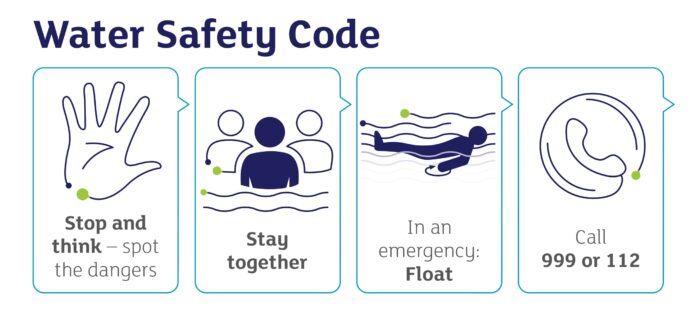With the UK set for scorching sunshine this upcoming bank holiday and people heading off for the long weekend, the Royal Society for the Prevention of Accidents (RoSPA) has warned people to stay safe around water and on the road.
The reminder comes as three young people have died this week in the UK’s canals and multiple road collisions have taken place on its roads.
Keeping safe around water
Carlene McAvoy, Leisure Safety Manager at The Royal Society for the Prevention of Accidents (RoSPA), said:
“While the riverside may seem like a natural beauty spot, we do unfortunately see around 70 people a year drown in UK rivers. What’s more, data shows us that almost half of people who drown in the UK have no intention of being in the water at all.
“Open waters pose a risk all year round, though in winter we see more slippery riverbanks, icier paths and freezing cold waters which are often less than 15 degrees. And with that, comes the risk of cold water shock.
“Cold water shock is often a precursor to drowning and causes the blood vessels in the skin to close. This then increases blood pressure and makes the heart work much harder and can overpower even the strongest of swimmers.
“The cold water can also cause an involuntary gasp for breath and cause your breathing rate to increase dramatically. In this scenario, the chances of inhaling water into the lungs increases – and sadly, even a small amount of water is enough to take an adult’s life.”
Staying safe on the road
Rebecca Guy, Road Safety Manager at RoSPA, said:
“Bank holiday weekends are a fantastic opportunity for people to catch up with their loved ones and enjoy some time away from home. But for some families, this turns into tragedy on our roads.
“Ahead of the bank holiday weekend, we urge all drivers to make a few basic vehicle checks that could end up saving their life, and to take an ample supply of food and drink should they get stuck on the motorway for a long time.”
“We advise people do a ‘POWDER check’ before they set off, which includes petrol or other fuel, oil, water, damage, electrics, and rubber (tyres).
Fuel
Before setting out, check your fuel or charge levels and make sure you have enough to get to your destination.
Engine oil
Use your dipstick to check oil regularly and before any long journey, and top up if needed. Take your car back to the garage if you’re topping up more than usual.
Water or screenwash
To ensure you have good visibility, always keep your screen wash topped up so you can clear debris or dirt off your windscreen. Check all fluid levels, including coolant.
Vehicle damage
Look out for any damage to your vehicle such as broken mirrors.
Electrics including lights
If your indicators, hazard lights, headlights, fog lights, reverse lights or brake lights are not functioning properly, you are putting yourself and your family at risk. In addition, light malfunctions can be a reason for your vehicle to fail its MOT. If a bulb has failed, change it at the first opportunity.
Rubber/tyres
Before setting off on a long journey, check your tyre pressures are suitable for the load and the condition of your tyres, including the spare.
Look out for cuts or wear and make sure that you change your tyres at 3mm because while tyres should have a minimum tread depth of 1.6mm, which is the legal limit., changing them ahead of that point is always good practice. Tyres under 3mm of tread will not perform as well in the wet.
Finally, before every journey, ensure that you are fit to drive. Make sure that you are well-rested, are feeling calm and are well. If you are taking any medication, read the leaflet and if you experience any side effects that could affect your ability to drive safely.
Help keep news FREE for our readers
Supporting your local community newspaper/online news outlet is crucial now more than ever. If you believe in independent journalism, then consider making a valuable contribution by making a one-time or monthly donation. We operate in rural areas where providing unbiased news can be challenging. Read More About Supporting The West Wales Chronicle
























